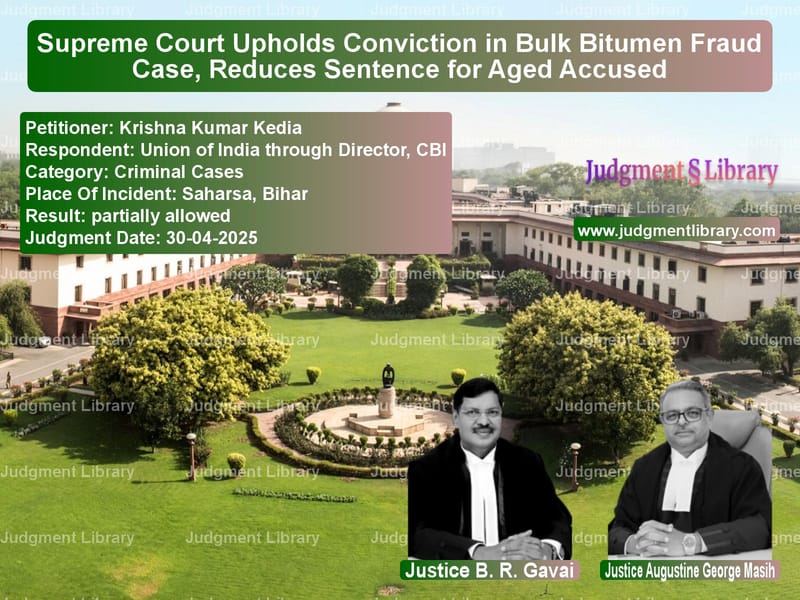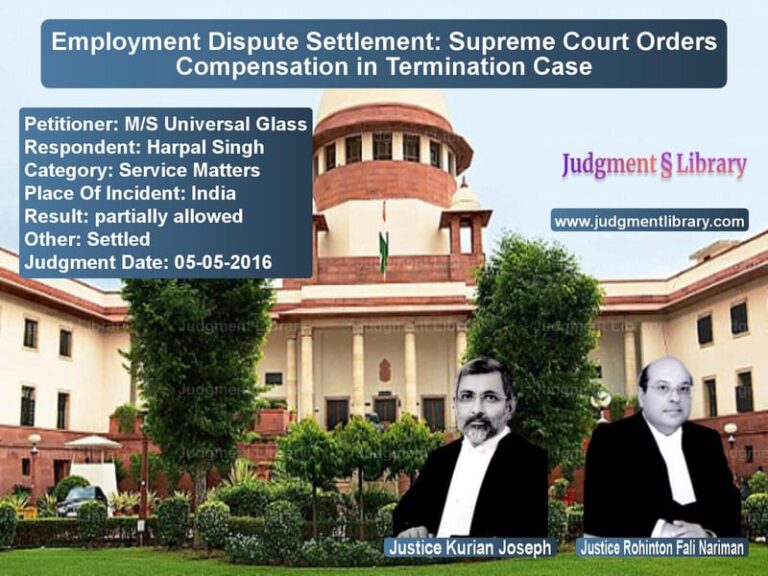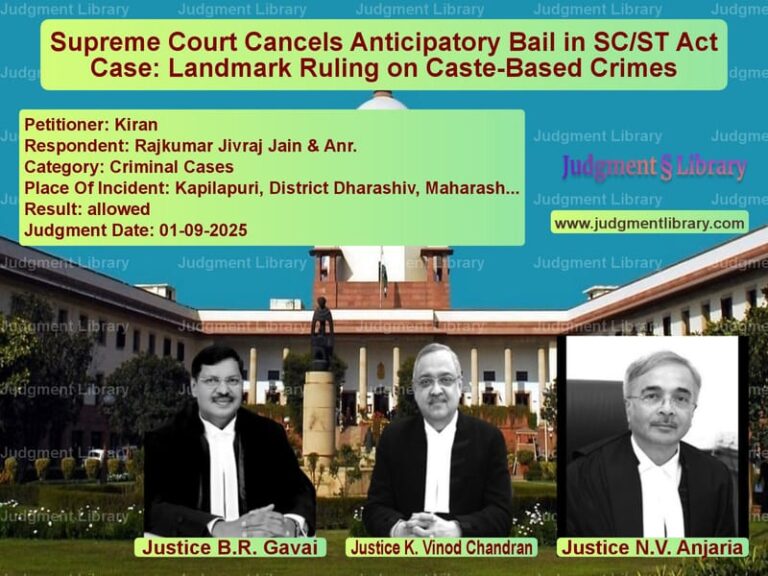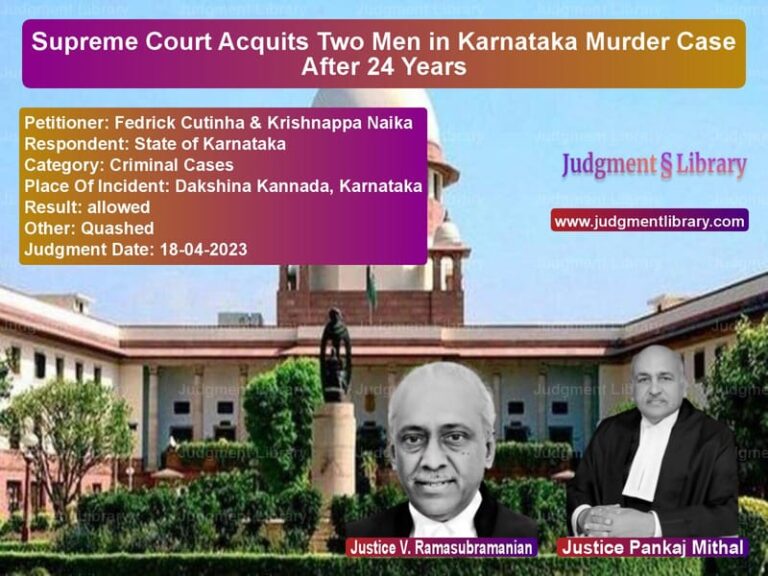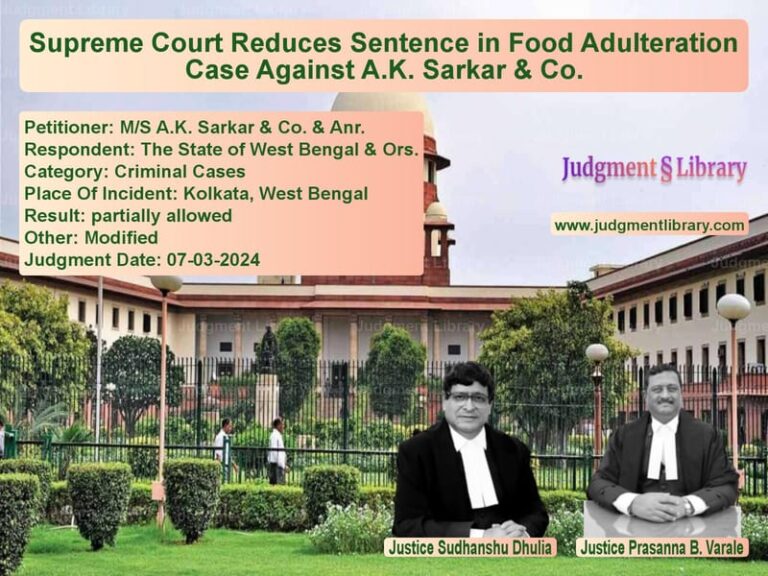Supreme Court Upholds Conviction in Bulk Bitumen Fraud Case, Reduces Sentence for Aged Accused
The Supreme Court of India recently delivered a judgment in the case of Krishna Kumar Kedia vs. Union of India, upholding the conviction of the appellant for offences under Sections 407, 420, 465, and 471 of the Indian Penal Code (IPC). The case involved a fraudulent scheme to misappropriate bulk bitumen worth INR 54,07,920 from the Road Construction Department (RCD), Saharsa Division, Bihar. While the Court affirmed the conviction, it reduced the sentence considering the appellant’s advanced age and health conditions. Here’s a detailed analysis of the judgment, the arguments presented, and the Court’s reasoning.
The case dates back to 1994 when a forged supply order (No. 413(E)) was created for the delivery of 1091.95 MT of bulk bitumen to M/s Cosmo Transport, a company owned by the appellant, Krishna Kumar Kedia. The bitumen was lifted from Indian Oil Corporation (IOC), Haldia, but never delivered to the RCD, Saharsa Division. Instead, it was diverted and sold illegally. The fraud came to light when the Executive Engineer of Saharsa Division lodged a complaint, leading to an investigation by the CBI. Four accused were initially charged, but two died during the trial, and one turned approver (Maheshwari Prasad, PW-5). The appellant, as the main accused, was convicted by the Special Judge, CBI-II, Patna, in 2015, and his appeal was dismissed by the Patna High Court in 2018.
The appellant’s counsel argued that there was no evidence of wrongful gain or loss to the state, as the prosecution failed to prove that the government exchequer suffered any damage. They contended that the approver’s testimony (PW-5) was unreliable, as no independent evidence, such as a handwriting expert’s report, was produced to confirm the forgery. Additionally, they claimed that the appellant had no knowledge of the forged documents used to lift the bitumen and that the IOC would not have released the consignment without proper authorization. The defense also highlighted that the appellant, now 71 years old and suffering from multiple ailments, had already endured 1.5 years of imprisonment and 30 years of legal trauma, warranting a lenient sentence.
The respondent, represented by the Additional Solicitor General, countered these arguments by presenting evidence that the supply order was forged at the appellant’s behest. The approver (PW-5) admitted to forging the signatures of Mr. MP Sinha, the Executive Engineer, on the authorization letters. Witnesses from M/s Cosmo Transport (PW-13 and PW-25) confirmed that the bitumen was lifted from Haldia and diverted to Alampur, Kolkata, under the appellant’s instructions. Departmental officials (PW-6, PW-9, PW-20, etc.) testified that no bitumen was received at Saharsa Division, and stock registers showed no entries for the consignment. The prosecution also established that the appellant’s statement under Section 313 CrPC admitted to receiving the bitumen but failed to prove its delivery to the RCD.
The Supreme Court, after reviewing the evidence, upheld the conviction, stating: “The case of the prosecution rests not only upon the evidence of Maheshwari Prasad, the accused turned approver who had forged and fabricated the documents on the asking of the appellant but also on the documentary evidence produced to substantiate the allegations apart from the oral evidence of the witnesses.” The Court noted that the appellant’s defense relied solely on Consignee Receipt Certificates (CRCs), which were proven to be forged. The judges emphasized: “No admissible evidence has been produced by the Appellant in respect of due delivery of Bulk Bitumen to Road Construction Department, Saharsa Division after having taken delivery of Bulk Bitumen as per his own admitted case in his statement under Section 313 CrPC.”
However, considering the appellant’s age (71 years), health (diabetes and a history of heart attacks), and the 30-year delay in the case, the Court reduced his sentence from 5 years to 2.5 years of rigorous imprisonment under Sections 407 and 420 IPC, while maintaining the fines. The sentences for forgery (Sections 465 and 471 IPC) remained unchanged at 2 years. The Court directed the appellant to surrender within four weeks to serve the remaining sentence.
This judgment underscores the judiciary’s commitment to upholding accountability in cases of fraud while balancing humanitarian considerations for aged convicts. It also highlights the importance of documentary and testimonial evidence in establishing guilt beyond reasonable doubt.
Petitioner Name: Krishna Kumar Kedia.Respondent Name: Union of India through Director, CBI.Judgment By: Justice B. R. Gavai, Justice Augustine George Masih.Place Of Incident: Saharsa, Bihar.Judgment Date: 30-04-2025.Result: partially allowed.
Don’t miss out on the full details! Download the complete judgment in PDF format below and gain valuable insights instantly!
Download Judgment: krishna-kumar-kedia-vs-union-of-india-throu-supreme-court-of-india-judgment-dated-30-04-2025.pdf
Directly Download Judgment: Directly download this Judgment
See all petitions in Fraud and Forgery
See all petitions in Theft and Robbery Cases
See all petitions in Judgment by B R Gavai
See all petitions in Judgment by Augustine George Masih
See all petitions in partially allowed
See all petitions in supreme court of India judgments April 2025
See all petitions in 2025 judgments
See all posts in Criminal Cases Category
See all allowed petitions in Criminal Cases Category
See all Dismissed petitions in Criminal Cases Category
See all partially allowed petitions in Criminal Cases Category

